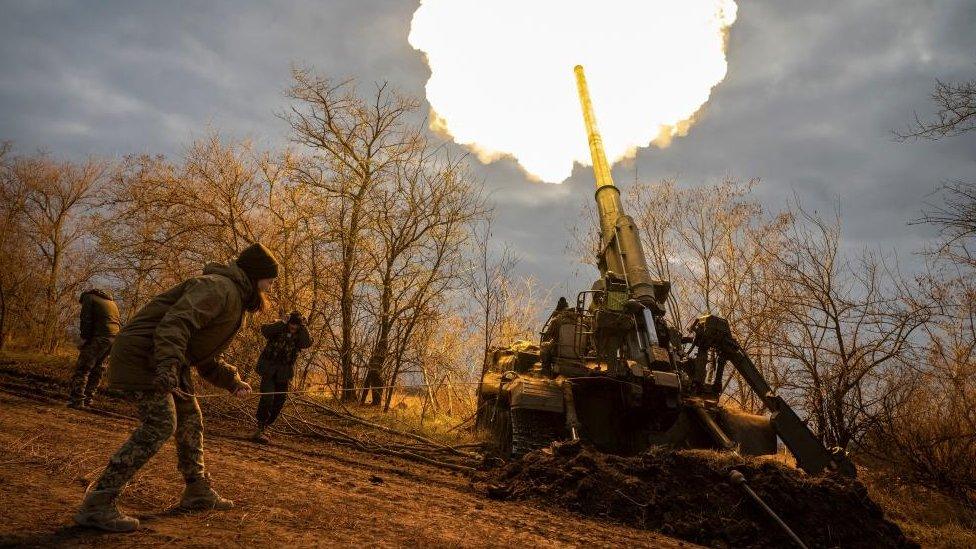Ukraine war: Russia 'deliberately' destroyed Kherson infrastructure - Zelensky
- Published
- comments
Watch: President Zelensky meets crowds in Kherson
President Volodymyr Zelensky has accused Russian troops of destroying "critical infrastructure" during their withdrawal from the city of Kherson.
Kyiv's forces re-entered Kherson- the only major Ukrainian city to fall to Russian forces - last week.
But in a nightly address, Mr Zelensky said Moscow's forces had mined "all important objects" in the region as they retreated.
The comments came ahead of his address to the G-20 summit of world leaders.
"This is what the Russian flag means - complete desolation," Mr Zelensky said. "There is no electricity, no communication, no internet, no television. The occupiers destroyed everything themselves - on purpose. This is their special operation."
"On the eve of winter, the Russian occupiers destroyed absolutely all critical infrastructure for the people. Absolutely all important objects in the city and region are mined," he added.
In a visit to the city on Monday, Mr Zelensky said that Ukraine is "moving forward".
Kherson was captured in March, weeks after the invasion began. The region was then one of four to be illegally annexed after self-styled referendums in September.
Losing the southern city is a major setback for Russia - though Moscow insists it remains Russian territory. Russia declared it the centre of the illegally annexed Kherson region, and it was the only regional capital to be occupied since the invasion.
Pro-Russian billboards on the drive in to the city - along with periodic crumps of artillery - act as a reminder that Russian President Vladimir Putin's men have not left completely, though.
At a ceremony in Moscow, Putin said the annexation of Luhansk, Donetsk, Zaporizhzhia and Kherson was "non-negotiable". Russia still occupies the cities of Donetsk and Luhansk, seized by Russian-backed separatists in 2014.
The invasion has left Russia internationally isolated - a fact underlined on Monday by a UN General Assembly resolution calling for Russia to be held accountable over Ukraine.
It was supported by 94 of the assembly's 193 members and is not binding, but carries political weight.
It said Russia "must bear the legal consequences of all of its internationally wrongful acts, including making reparation for the injury, including any damage, caused by such acts". Four previous UN resolutions have also criticised Russia's invasion.
In recent weeks Ukraine has made gains in the south of the country, driving towards Kherson and putting Russian forces under increasing pressure.
Last week, Russian forces withdrew and Ukrainian troops entered the city on Friday.
Locals were seen celebrating, some reuniting with loved ones they had not seen for months. The mood in the city was one of jubilation and relief, but also trepidation, the BBC's Jeremy Bowen reports.
Echoing that caution was Nato Secretary General Jens Stoltenberg, who warned it would be a "mistake" to "underestimate Russia".
"The coming months will be difficult," he told Dutch government officials. "Putin's aim is to leave Ukraine cold and dark this winter. So we must stay the course."
Footage from social media shows a Ukrainian soldier shouting "Greetings from Kherson".
During his visit on Monday, Mr Zelensky sang the Ukrainian national anthem as the country's flag was hoisted above the main administrative building.
"We are ready for peace, but peace for our whole country," he said. "This is the territory of our entire country... That is why we are fighting Russian aggression."
"Step by step," he said, "we are moving towards all the occupied territories of our country. Of course this is difficult. This is a long and difficult path."
He thanked Nato and other allies for their support, adding that high mobility artillery rocket systems (Himars) from the United States had made a big difference.
The president also addressed a crowd in the city's main square, some of whom waved Ukrainian flags or wore them draped across their shoulders.
Asked where Ukrainian forces might advance next, he said: "Not Moscow... We're not interested in the territories of another country."
The president also joked he had come to Kherson because he "wanted a watermelon" - in reference to the locally grown fruit which has become a popular Ukrainian symbol of resistance.
Unlike other liberated areas, Kherson is relatively undamaged. The Kremlin tried to make its occupation appear legitimate here.
As the city emerged from its own kind of lockdown - an oppressive eight-month Russian occupation - shops could this week accept Ukrainian hryvnia for the first in a long time. They had previously been forced to trade with the Russian rouble.
At a grocery store, which stayed open throughout the occupation, workers said Russian soldiers would "come in for free beers". If refused, the soldiers "said they'd come back and kill us", the workers claimed.
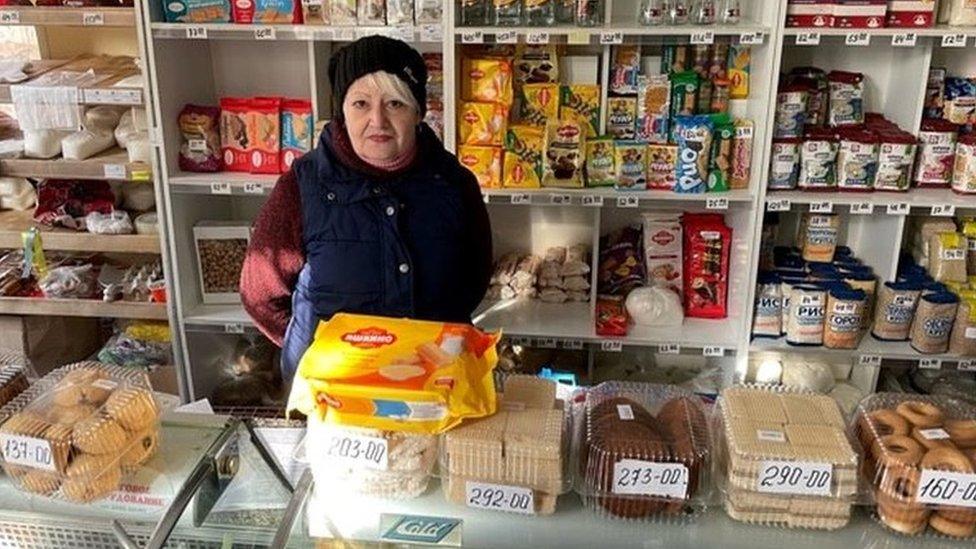
One supermarket was pleased to be trading in local currency again
In response to Mr Zelensky's visit, the Kremlin said that Kherson was part of Russia.
"We leave this without comment," Kremlin spokesman Dmitry Peskov said, adding: "You know, this territory is part of the Russian Federation."
Deputy Foreign Minister Alexander Grushko said Russia would not agree to withdrawing troops as a prerequisite for peace talks.
"Such conditions are unacceptable," the Russian news agency Interfax quoted him as saying on Monday.
"Our president has repeatedly said that we are ready for talks. But these talks, naturally, should take into account the situation on the ground."
Earlier Mr Zelensky said investigators had uncovered more than 400 war crimes in areas of Kherson abandoned by Russian forces as they retreated.
The BBC has been unable to verify these allegations, and Moscow denies that its troops intentionally target civilians.
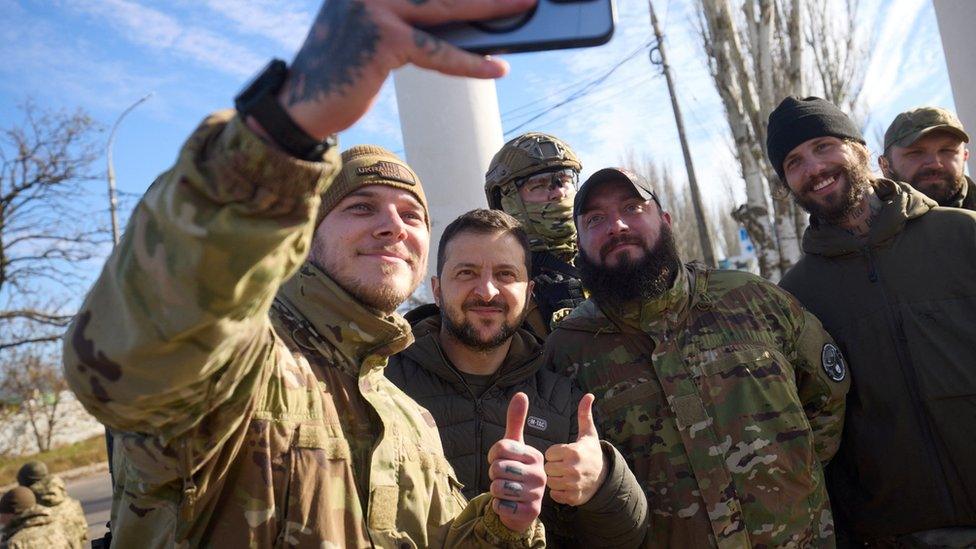
President Zelensky with soldiers on Monday

Related topics
- Published14 November 2022
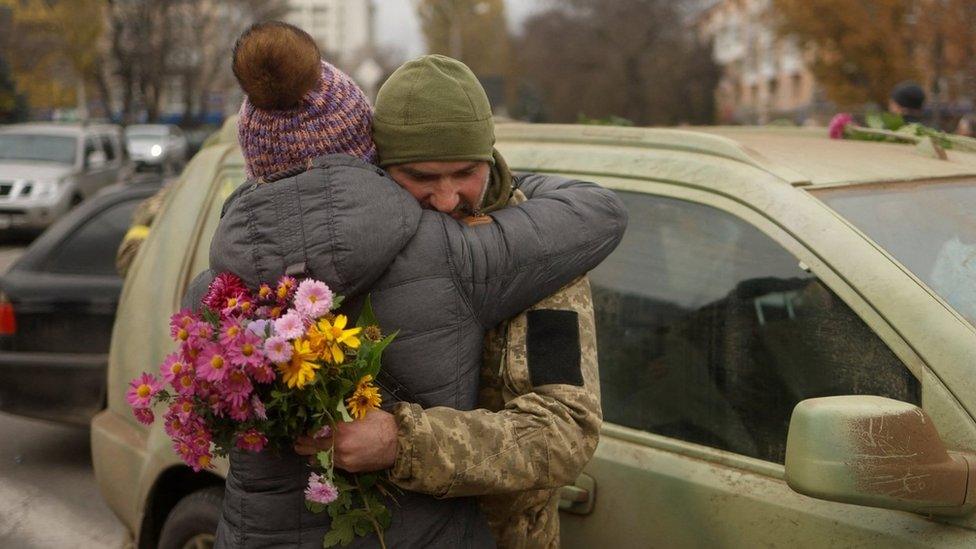
- Published12 November 2022
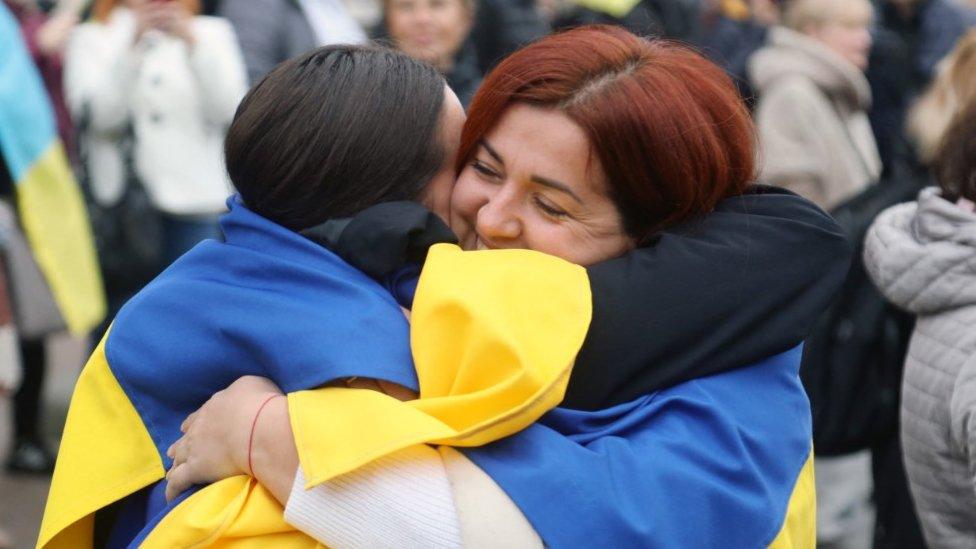
- Published10 November 2022
